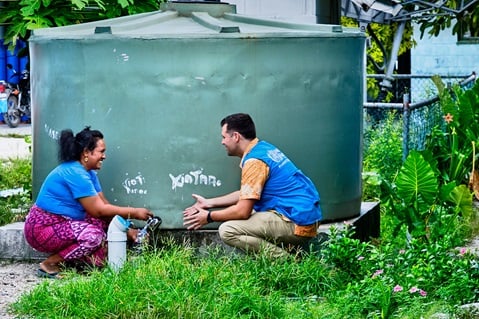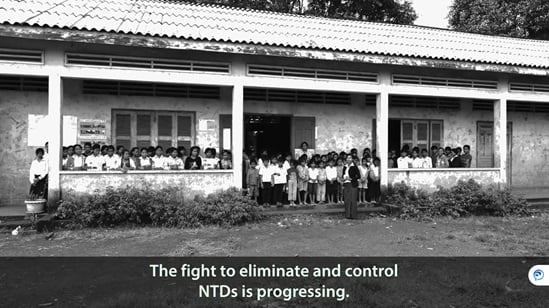Schistosomiasis
Schistosomiasis is an acute and chronic parasitic disease caused by blood flukes (trematode worms). Humans are infected when larval forms of the parasite penetrate the skin during contact with infested water. Schistosomiasis mostly affects poor and rural communities, particularly agricultural and fishing populations. Inadequate hygiene and contact with infected water make children especially vulnerable to infection.
In the Western Pacific Region, intestinal schistosomiasis caused by Schistosoma japonicum is endemic in China and the Philippines, and that caused by Schistosoma mekongi is endemic in two provinces in Cambodia and one province in the Lao People’s Democratic Republic (Lao PDR).
Intestinal schistosomiasis can result in abdominal pain, diarrhoea and blood in the stool. Liver enlargement is common in advanced cases.
Elimination of schistosomiasis in the Region is targeted through community empowerment with the One Health approach, composed of health promotion, improved water, sanitation and hygiene (WASH), preventive chemotherapy campaigns, treatment and management of domestic animals and livestock, and focal snail control.
Community-led initiatives on WASH called Community-Led Initiative to Elimination Schistosomiasis through WASH-NTD collaboration (CL-SWASH), are being implemented in Cambodia and Lao PDR. Under CL-SWASH, communities voluntarily improve sanitation coverage in schistosomiasis-endemic communities, facilitated by WASH and neglected tropical disease teams.
Symptoms of schistosomiasis are caused by the body’s reaction to the worms' eggs.
Intestinal schistosomiasis can result in abdominal pain, diarrhea, and blood in the stool. Liver enlargement is common in advanced cases and is frequently associated with an accumulation of fluid in the peritoneal cavity and hypertension of the abdominal blood vessels. In such cases, there may also be enlargement of the spleen.
The classic sign of urogenital schistosomiasis is haematuria (blood in urine). Fibrosis of the bladder and ureter and kidney damage are sometimes diagnosed in advanced cases. Bladder cancer is another possible complication in the later stages. In women, urogenital schistosomiasis may present with genital lesions, vaginal bleeding, pain during sexual intercourse, and nodules in the vulva. In men, urogenital schistosomiasis can induce pathology of the seminal vesicles, prostate, and other organs. This disease may also have other long-term irreversible consequences, including infertility.
The economic and health effects of schistosomiasis are considerable and the disease disables more than it kills. In children, schistosomiasis can cause anemia, stunting, and a reduced ability to learn, although the effects are usually reversible with treatment.
Praziquantel is the recommended treatment against all forms of schistosomiasis. It is effective, safe, and low-cost. Even though re-infection may occur after treatment, the risk of developing severe disease is diminished and even reversed when treatment is initiated and repeated in childhood.
Schistosomiasis control has been successfully implemented over the past 40 years in several countries around the world. With the support of partners, it has been possible to scale-up schistosomiasis treatment to the national level and have an impact on the disease in a few years. An assessment of the status of transmission is required in several countries. In the Western Pacific Region, the governments of China and Switzerland have pledged funding to support the interruption of transmission of the disease in both Cambodia and Lao PDR.






